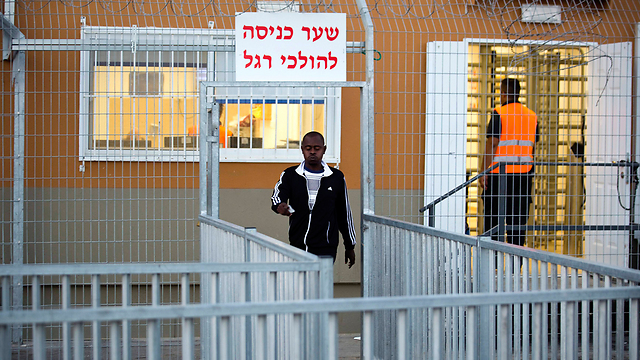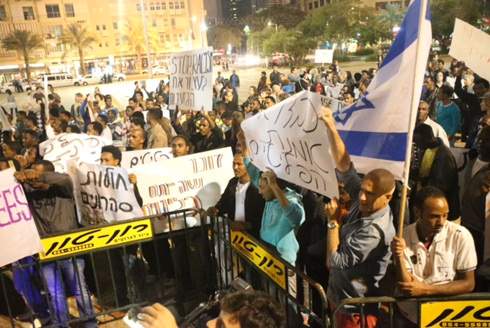
The Ministry of the Interior on Wednesday distributed a legal memorandum with another revision of an amendment to the Prevention of Infiltration Law, after the two previously proposed bills were rejected by the High Court of Justice as unconsitutional.
The new bill, which will be sent to the Knesset for approval, established that asylum seekers and migrant workers would continue to be summoned to the Holot detention facility, but their time there would be limited to 20 months instead of three years. The bill took shape amid a dispute on the issue between outgoing Interior Minister Gideon Saar and Attorney General Yehuda Weinstein.
The state hopes to double the area of the facility, which can currently hold about 3,000 people. According to the Population and Immigration Authority, about 48,000 asylum seekers and infiltrators are now in Israel. The new bill said that those who stay at the shelter would receive a grant of $3,500 if they leave Israel. The grant in question was also part of the previous bill. During their stay at the shelter, they would be barred from employment.
According to a High Court ruling, the government must ratify the bill by December 22, when the 2,400 asylum seekers are to be released.
Despite the intent to enact the bill on time, it is already expected to raise opposition from, among others, the Knesset's Internal Affairs Committee headed by Likud MK Miri Regev.
If the bill becomes law, new asylum seekers would be sent to Saharonim detention facility for three months, followed by 20 months at Holot. It should be noted that since completion of the border fence with Egypt, only a few people have made their way into Israel.
In south Tel Aviv, where some residents continued to protest against the asylum seekers, locals criticized the new bill. "The government keeps leading residents on and keeps forsaking us," declared Shefi Paz, a local resident who is among the leaders of the campaign.
"The new bill won't solve the problem," he said. "We expect an immediate and comprehensive solution. This is a problem the government created ever since it bussed tens of thousands of infiltrators to our neighborhoods."
Other residents said the new bill did not go far enough.
"The bill is great, but doesn't solve the problem in south Tel Aviv because currently no one's coming into Israel because of the fence," said local Ayala Sinawi. "We need a solution to get them out of south Tel Aviv, out of our neighborhoods. I hope the bill passes the High Court, but we've got to remove those who are already here quickly. The sense of security is getting worse, especially with all the escalation in the country."
Mai Golan, also a resident of south Tel Aviv, said: "I'm in favor of this bill, it's a basic tool to deal with the infiltration phenomenon, but it's only the beginning of a solution to the plight of local residents. The government is capitulating to the infiltrators, who don't even need to be here. The holding period is short. There shouldn't be a definite length of time. They should stay in a detention center until they go back to their countries of origin."
Shlomo Maslawi, chairman of the Southern Neighborhoods of Tel Aviv Committee, said: "The most important thing about this bill is no employment. As soon as they're not employed they won't come into the country, because that's the reason they come here, and I believe that they'll find their way home. I think that in terms of imprisonment, the law is fine. Time will tell how much it'll be enforced. What's important is that there will be serious enforcement. Today the enforcement is on a small scale."
The new bill included additional clauses. People staying at Holot would be required to present themselves once a day, instead of the three times a day set out in the rejected bill. Employers of foreign workers would be required to make a monthly deposit into an account for the worker's severance pay. A regular payment would be taken out of the employee's salary for the deposit. The deposit would be given to workers only after they leave the country, which is meant to encourage the worker to leave Israel on time.
The new bill proposes higher administrative fines than those prescribed by current regulations, with the goal of worsening penalties for those who employ anyone who has been summoned to Holot and banned from employment, or a worker whose temporary license has expired. A statement by the Population and Immigration Authority said that the changes to the bill were "meant first and foremost to find an arrangement to deal with the phenomenon of infiltration into Israel, which will end the phenomenon while also passing the requirements demanded by the High Court."
Several human rights organizations have criticized the amended bill. They released a statement saying that, "although the Supreme Court and state comptroller have time and again made it clear that imprisonment is not a solution for those who cannot return to their countries, the government insists on repeating the mistakes of the past, and for a third time presents an illegal arrangement, whose stated goal is to pressure asylum seekers and force them to flee to the places where they are in danger.
"It's a shame that the new interior minister is continuing the failed policy and isn't taking advantage of the opportunity to act towards a real solution: taking money that had been allocated to prisons and investing it in improvement of infrastructure and services in these neighborhoods, and creating a natural dispersal of asylum seekers through the use of planned work permits and incentives for employers around the country. We call on the government to take advantage of this opportunity, and not to continue pushing forward the kind of bill that was already rejected twice by the High Court."
Israeli Immigration Policy Center spokesman Yonatan Yakobovich took a different view. He said that a monthly salary for Eritrean workers in Israel equals an average bi-annual salary in their home country.
"The new initative, meaning a maximum holding period in Holot of only 20 months, won't succeed in the purpose of the bill: deterring future infiltrators and voluntary emigration of infiltrators who are already in Israel, and it constitutes the Israel government's surrender and acceptance of the infiltrators' continued stay in Israeli territory in general and south Tel Aviv in particular."


















